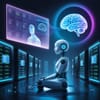Artificial intelligence (AI) is rapidly advancing, and some experts predict it will soon surpass human intelligence. Elon Musk has forecasted that AI will be smarter than any individual human within the next year or two, and potentially outsmart all humans combined by 2029 or 2030.
This concept is often referred to as the "technological singularity," where AI growth becomes uncontrollable and irreversible, leading to unforeseeable consequences for human civilization. Some researchers believe that creating superhuman or transhuman minds is possible through methods like bioengineering, genetic engineering, or artificial intelligence.
However, not everyone agrees that AI will surpass human intelligence. Some prominent technologists and academics dispute the plausibility of a technological singularity, citing potential limitations in computing power and the complexity of human intelligence.
The debate surrounding the future of AI development is ongoing, with experts offering varying predictions and timelines for achieving superhuman AI. While some predict human-level AI by 2040, others foresee a singularity by 2045. Elon Musk's prediction of AI surpassing human intelligence by 2029 or 2030 has also sparked significant interest and discussion.
As AI continues to advance, it's essential to acknowledge the uncertainty surrounding its future development and the potential implications for human civilization.


